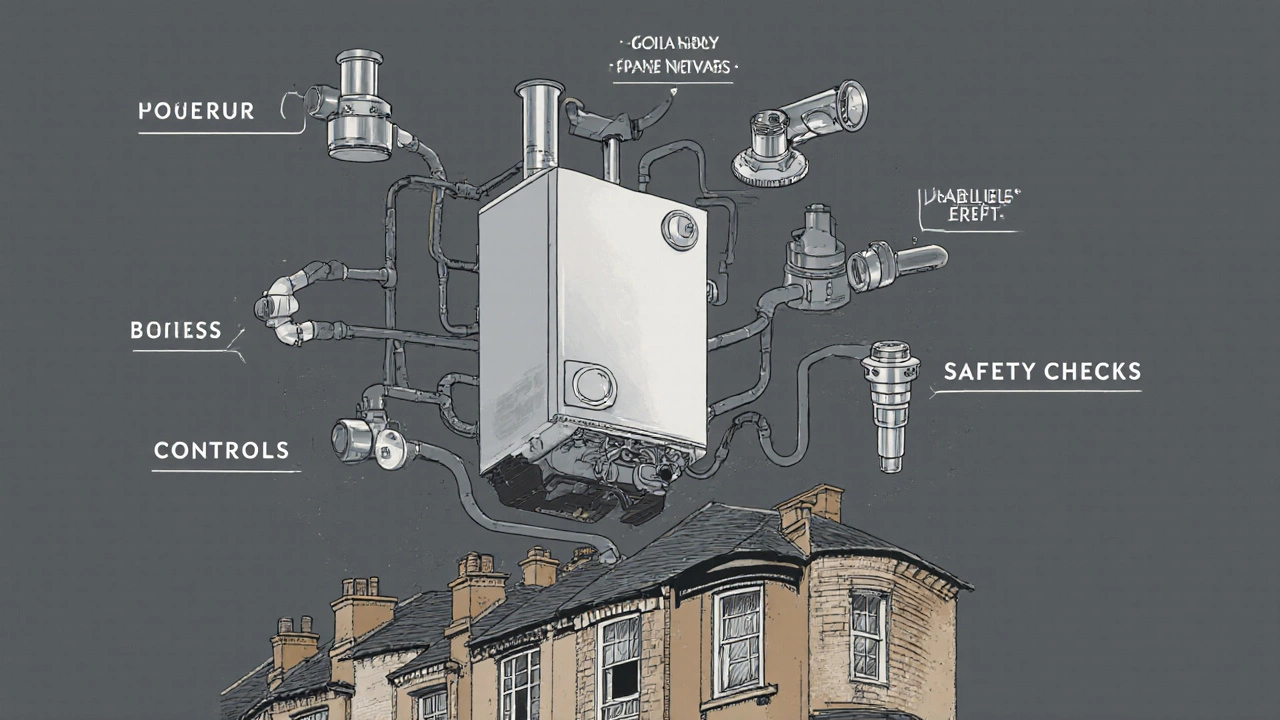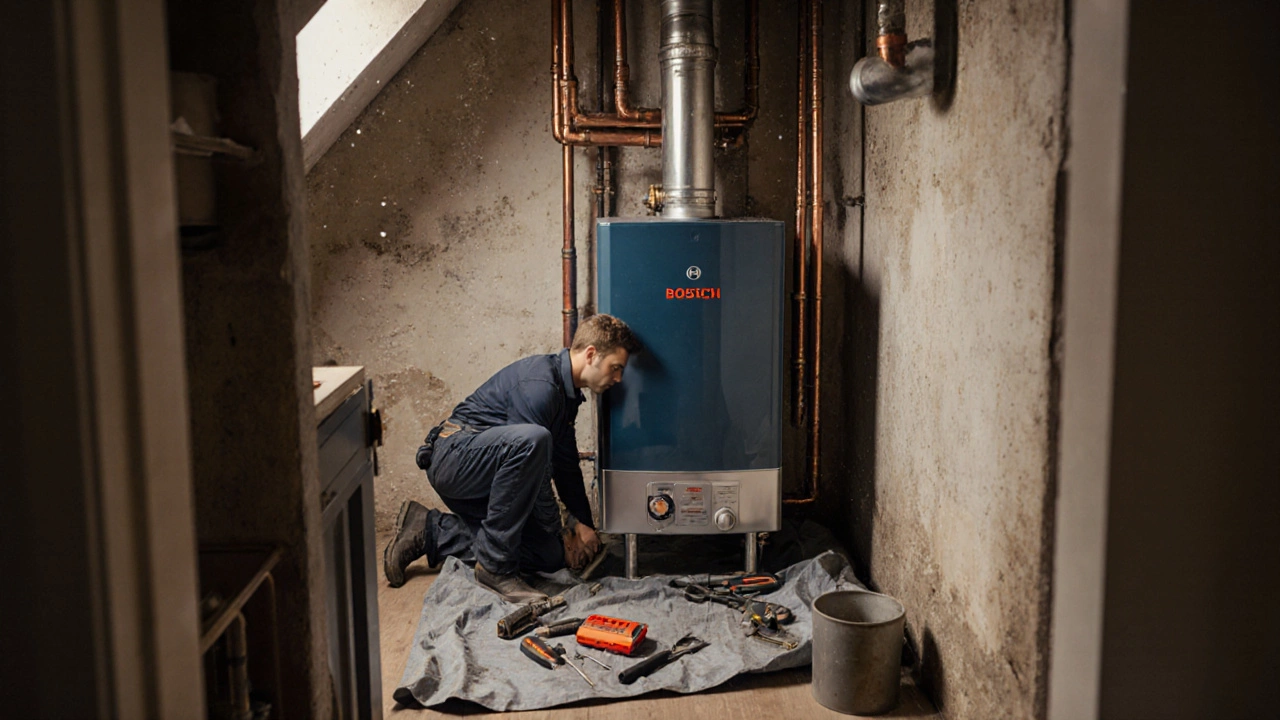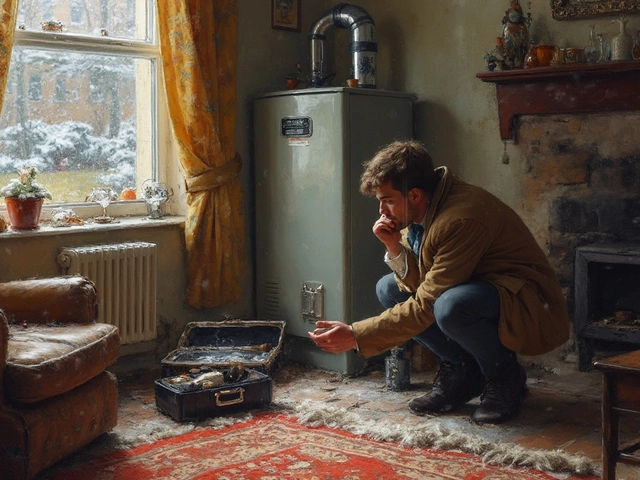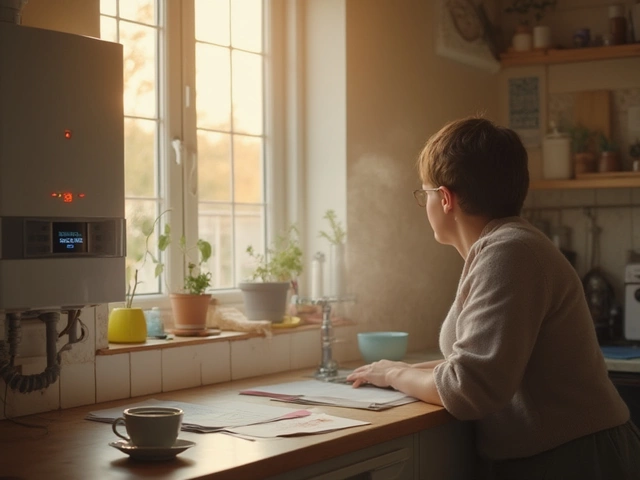Boiler Replacement Cost Calculator
Key Cost Drivers
- Older systems require more upgrades
- Cramped locations increase labour time
- Compliance with Gas Safety Regulations
- System flushing prevents future damage
Replacing a boiler isn’t just another home repair-it’s one of the biggest, most expensive jobs you’ll ever face. If you’ve gotten a quote and felt shocked, you’re not alone. In the UK, the average cost to replace a boiler in 2025 sits between £2,500 and £4,500. For some, it’s even higher. But why? It’s not just the price of the machine. There’s a lot more going on under the hood.
The Boiler Itself Isn’t the Main Cost
People often think the boiler is the big expense. It’s not. A standard gas boiler, like a Worcester Bosch Greenstar or Vaillant EcoTec, costs between £800 and £1,800. That’s less than half of what you’ll pay overall. The real cost comes from what happens around it. Labour, pipework, flues, controls, and safety checks add up fast.
Think of it like buying a new car. The engine might cost £5,000, but if you need new brakes, suspension, wiring, and a full paint job to make it roadworthy, you’re looking at £15,000. Same idea. The boiler is just the engine.
Labor Costs Are High-And for Good Reason
Gas Safe registered engineers don’t come cheap. In Bristol and across the UK, hourly rates for qualified boiler installers range from £50 to £85. A full boiler replacement takes 1-3 days, depending on complexity. That’s £500 to £2,500 just for labour.
Why so much time? Because boiler replacement isn’t just swapping out a unit. It’s a full system reset. The old boiler gets disconnected, the flue might need rerouting, pipes may need replacing, the condensate pipe needs to be moved, and the new unit has to be perfectly level and vented. Then there’s system flushing, pressure testing, gas leak checks, and commissioning. One mistake, and you risk carbon monoxide leaks or system failure. That’s why only certified engineers can do it.
Old Systems Mean Old Problems
If your boiler is 15+ years old, chances are your whole heating system is outdated. You might have:
- Single-pipe systems that don’t work well with modern condensing boilers
- Undersized or corroded pipes
- Outdated radiators that don’t circulate heat efficiently
- Non-compliant flue routes that violate current building regulations
Modern boilers need low-temperature, high-flow systems. Older homes often have the opposite. So when you install a new boiler, you’re not just replacing a unit-you’re upgrading the entire network. That means:
- Replacing copper pipes (cost: £300-£1,200)
- Installing new thermostats and smart controls (cost: £200-£600)
- Adding a system filter to protect the new boiler (cost: £150-£300)
- Flushing the entire heating system (cost: £300-£500)
These aren’t optional extras. They’re necessary to make the new boiler last and run safely. Skip them, and you’ll be calling the engineer again in two years.
Regulations and Safety Checks Add Up
The UK has strict rules for gas installations. Every boiler replacement must follow Gas Safety (Installation and Use) Regulations 1998 and Building Regulations Part L for energy efficiency. That means:
- Flue placement must meet minimum distances from windows, doors, and boundaries
- Condensate pipes must be insulated and routed to a drain
- Every installation must be registered with Gas Safe within 30 days
- Carbon monoxide alarms must be installed if one isn’t already present
Failure to comply isn’t just risky-it’s illegal. Installers have to carry insurance, keep records, and submit paperwork. That overhead gets passed on. And if your property is listed or in a conservation area? You might need planning permission. That adds weeks and hundreds more in fees.

Location and Access Make a Big Difference
Not all homes are built the same. If your boiler is in a cramped cupboard under the stairs, or tucked behind a bathroom wall, the job gets harder. In Bristol, I’ve seen installers spend an extra day just removing plasterboard, moving pipes, and creating access points.
Here’s what makes it harder:
- Boilers in lofts or high up on walls-need scaffolding or lifts
- Properties with no external wall access-flue must go through the roof
- Older homes with uneven floors-boiler won’t sit level without shimming
- Shared flues in flats-requires coordination with neighbours and building management
These aren’t rare cases. In the UK, over 60% of homes built before 1980 have awkward boiler locations. That’s not a design flaw-it’s just how things were built. But it means your install could cost £500-£1,000 more than the average.
Why You Can’t Just Buy One Online and Install It Yourself
You might think, “I’ll buy the boiler on Amazon and fit it myself.” That’s a dangerous idea. First, it’s illegal. Only Gas Safe engineers can legally connect a gas boiler. Second, you’ll void the warranty. Most manufacturers require professional installation and registration to activate the 7-10 year guarantee.
Even if you’re handy, you won’t have the tools: gas pressure testers, flue gas analysers, system flush pumps, or the training to interpret them. A small leak you miss could lead to carbon monoxide poisoning. That’s not a risk worth taking.
What You’re Really Paying For
When you pay £3,500 for a boiler replacement, you’re not just buying a machine. You’re buying:
- Safety: Certified installation, gas leak testing, carbon monoxide protection
- Reliability: Properly flushed system, matched components, balanced pressure
- Efficiency: Modern boiler + updated controls = 30% less gas use
- Peace of mind: 10-year warranty, legal compliance, insurance coverage
Compare that to the cost of a broken boiler in winter: no heat, no hot water, emergency call-out fees of £200+, and potential damage from frozen pipes. Replacing it now saves you more than money-it saves you stress, risk, and cold nights.

How to Avoid Being Overcharged
Not all quotes are equal. Here’s how to make sure you’re getting a fair price:
- Get at least three written quotes-ask for itemised breakdowns
- Check the engineer is Gas Safe registered (ask for their ID number and verify it online)
- Ask what’s included: Is system flushing included? Are controls included? Is the flue being replaced?
- Don’t fall for “free boiler” deals-those often mean a lower-grade unit or hidden fees
- Ask about the warranty: 2 years? 5 years? 10 years? What’s covered?
Some companies charge £4,500 for a top-end boiler with full system upgrade. Others charge £2,800 for a basic model with minimal changes. The difference isn’t always quality-it’s scope. Know what you’re paying for.
Is It Ever Worth Repairing Instead?
If your boiler is less than 10 years old and the issue is minor-a faulty pump, a broken thermostat, or a blocked condensate pipe-repairing it makes sense. Repairs typically cost £150-£400.
But if you’re facing:
- Repeated breakdowns (more than two in a year)
- High energy bills despite normal usage
- Strange noises or smells
- Boiler is over 15 years old
Then it’s not a repair job-it’s a replacement. Keeping an old boiler running is like patching a leaky roof. You’re spending more on fixes than you would on a new one.
What’s Next?
If you’re considering a replacement, start by checking if you qualify for government support. The Boiler Upgrade Scheme in 2025 still offers up to £7,500 for heat pumps, and some local councils in the West Country offer £1,000-£2,000 grants for boiler replacements in low-income households. Ask your installer-they often know what’s available.
Don’t wait until winter hits. Boilers fail when it’s coldest, and installers get booked out for weeks. Get quotes now. Compare. Ask questions. And remember: this isn’t just a cost-it’s an investment in safety, comfort, and your home’s future.
Why is boiler replacement more expensive than fixing it?
Boiler replacement isn’t just swapping a part-it’s upgrading the entire heating system. You’re paying for labour, new pipes, system flushing, safety checks, controls, and compliance with current regulations. Repairs fix one issue; replacement fixes the whole system to prevent future problems.
Can I save money by installing the boiler myself?
No. It’s illegal in the UK for anyone who isn’t Gas Safe registered to install a gas boiler. Even if you could, you’d void the manufacturer’s warranty, and a single mistake could lead to carbon monoxide leaks. The risks far outweigh any savings.
Do I need to replace my radiators when I replace my boiler?
Not always, but it’s often recommended. Old radiators can be clogged with sludge, which damages new boilers. If your radiators are over 15 years old or don’t heat evenly, flushing them or replacing them improves efficiency and protects your new investment.
What’s the difference between a combi, system, and regular boiler?
A combi boiler heats water on demand and doesn’t need a tank-ideal for smaller homes. A system boiler works with a hot water cylinder and is better for homes with multiple bathrooms. A regular boiler needs both a hot water tank and a cold water tank-common in older homes. The type you need depends on your home’s layout and hot water usage.
Are there grants or financial help for boiler replacement?
Yes. The UK government’s Boiler Upgrade Scheme offers up to £7,500 for heat pumps, and some local councils offer £1,000-£2,000 grants for low-income households replacing old gas boilers. Energy companies sometimes offer discounts too. Always ask your installer what’s available.
How long does a boiler replacement take?
Most replacements take one to two days. Simple swaps in easy locations can be done in a day. Complex jobs-like moving pipes, upgrading flues, or working in older homes-can take three days. Always ask for a timeline before booking.




